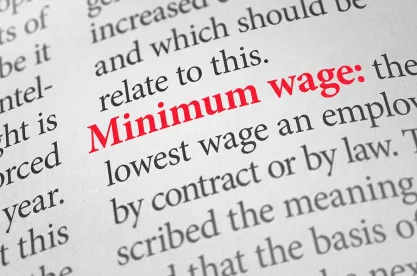As more employers are ‘named and shamed’ in the press for paying below the National Minimum Wage, the immediate question is “How can a large employer, with significant resources, be paying below the NMW by accident?”
There are numerous areas where employers may find themselves unwittingly paying below the NMW and on the naughty step after a visit from HMRC.
This topic has not has come to the forefront now because there has been any change in the way that the NMW is calculated. Instead there are two main factors at play. The first is that HMRC has had its budget for NMW enforcement increased significantly over the last few years. The second is the increasing rate for the NMW which, as it creeps towards the £9/hr target for 2020, is eroding the cushion which many employers believed they had between what they pay and the minimum wage.
This inadvertent underpayment can happen in a number of ways including:
-
Salary Sacrifice – where an employee is a member of a salary sacrifice scheme, such as for pension, childcare vouchers, etc., then this should not take his average hourly pay below the NMW. You get no credit for the value of the pension benefit or the childcare vouchers which salary has been exchanged for;
-
Uniform – if an employee has to supply any element of his own uniform then the cost of purchasing and cleaning will be deducted from his pay for the NMW purposes. ‘Uniform’ is defined very broadly in this context. The example given in the HMRC manual is of an employee working in a hairdressers and who has to wear a plain white t-shirt and black trousers. Both these items are considered ‘uniform’;
-
Salaried employees – many employers probably won’t worry about their salaried employees, providing that their annual salary is above NMW based on their contractual hours of work. However, a ‘salaried worker’ for NMW purposes is one whose required annual working hours are “ascertainable from his contract”. This should be relatively straightforward, shouldn’t it? They work 40 hours a week, so you just multiply that by 52 and you’ve ascertained the hours for the year. Sadly not. HMRC say that there are in fact 52.14 weeks in a year; an employee can’t therefore ascertain his hours for the year from the contract (although this is patent nonsense) and so is not a salaried worker for NMW purposes. So what? Well, with a salaried worker you look at the pay received over a whole year and the hours worked over the year and average them out to ensure NMW has been paid in each week or month. If an employee is not a salaried worker, however, the employer needs to ensure that he is being paid the correct amount each individual pay period based on the actual hours he works. This could mean that an employee may have weeks or months where he works more hours than normal and so for that particular period have been paid below NMW. In our experience HMRC will be keen to look at salaried employees being paid below £20,000 and explore what type of worker they are and whether they are being paid appropriately.
-
Record keeping – there is a requirement under the NMW Regulations to maintain sufficient records to evidence that the NMW has been paid for at least the last 3 years. It is a criminal offence not to do so. There is no particular format the records must take and it may be that payroll records are sufficient; however, this might not be the case where you have salaried employees whose hours of work you do not track and so you cannot evidence what hours they have actually worked. There is a presumption that an employee has not been paid the NMW unless an employer can prove to the contrary and so this is an added incentive to ensuring proper records are kept.
-
Working time – whether an employee has been paid NMW will depend on the pay received and the hours worked. On the face of it, what is ‘working time’ might seem a straightforward question – simply time spent by an employee doing his job. Again, that is not necessarily the case. If an employee has to go through any checks or undertake any mandatory steps before he can start work or leave afterwards, such as security searches or drug/alcohol tests, then the time spent going through these processes will also be working time.
Compliance is going to be an issue for more and more employers as the rate increases and they see their buffer eroded. It is therefore something you should be looking at proactively now so that you can address any potential problems before HMRC come knocking. There is a particular focus by HMRC on NMW compliance in the hospitality and leisure sectors at the moment. This was therefore the topic for our inaugural HOST event back in July. Through HOST we run a series of education and networking events for HR and legal professionals in these sectors. Do contact us for more details.
On a lighter note, HMRC released details earlier this year of the Top 10 worst reasons they had been given for paying below the National Minimum Wage:
-
The employee wasn’t a good worker so I didn’t think they deserved to be paid the National Minimum Wage.
-
It’s part of UK culture not to pay young workers for the first 3 months as they have to prove their ‘worth’ first.
-
I thought it was ok to pay foreign workers below the National Minimum Wage as they aren’t British and therefore don’t have the right to be paid it.
-
She doesn’t deserve the National Minimum Wage because she only makes the teas and sweeps the floors.
-
I’ve got an agreement with my workers that I won’t pay them the National Minimum Wage; they understand and they even signed a contract to this effect.
-
My accountant and I speak a different language – he doesn’t understand me and that’s why he doesn’t pay my workers the correct wages.
-
My workers like to think of themselves as being self-employed and the National Minimum Wage doesn’t apply to people who work for themselves.
-
My workers are often just on standby when there are no customers in the shop; I only pay them for when they’re actually serving someone.
-
My employee is still learning so they aren’t entitled to the National Minimum Wage.
-
The National Minimum Wage doesn’t apply to my business.




 />i
/>i

